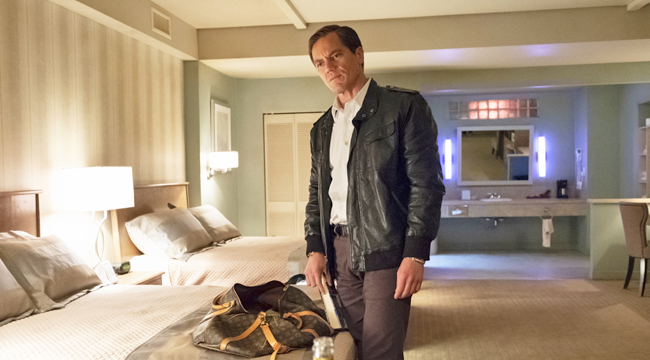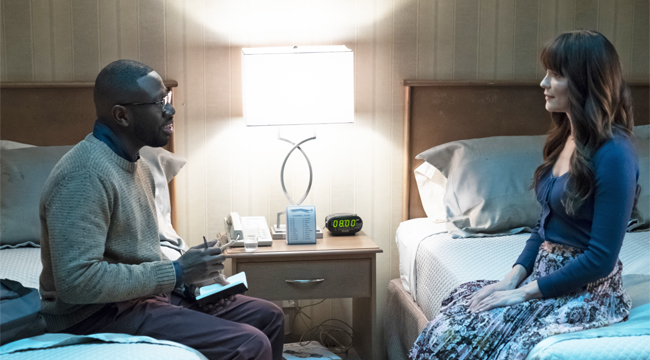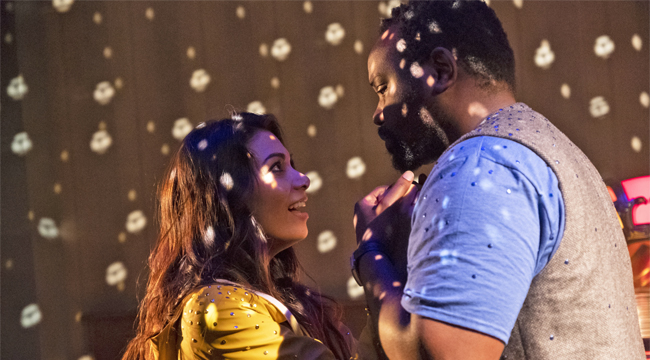
This past weekend, Room 104 returned for a second season on HBO, where the anthology series is somehow even more unpredictable despite remaining in its predictable setting, an utterly unremarkable hotel room that has already seen some sh*t. Brothers Mark and Jay Duplass have arrived with a fresh installment of surreal, suspenseful scenarios which dive in and out of various genres and prove that there’s no shortage of stories for this room to tell.
The second batch of such tales veers even further into strangeness. From an episode (“Swipe Right”) that stars Michael Shannon as a mysterious Russian who raps, to another (“Shark”) featuring Mahershala Ali as a hustler, to a musical installment (“Arnold”) starring Atlanta‘s Brian Tyree Henry, this season will take viewers places they’ve never been while never leaving the room’s unsettling confines.
Mark Duplass, who wrote roughly two-thirds of the season, spoke with us about the show’s risky methods and his hopes for the daring season finale.
You wanted to make this series for a good decade, and you told us that the first season was sort-of about unleashing what you and your brother were suppressing. Did you approach the second season differently?
That Room 104 is now a place where we get to tell a different kind of story, and that’s what’s still exciting to me about it. I think we’re leaning a little more into the strange and outlandish, and we’re having more fun with it. We’ve got this experimental place that HBO has given us, to play creatively and do what we want, and this is a kind-of once in a lifetime opportunity, we thought we’d just let loose a little bit with season 2.
You also called this the “the Tinder of the TV world” and now have a Michael Shannon-starring episode called “Swipe Right.” How did you get him to sign up to play a loverboy Russian with mad rap skills?
He was surprisingly excited to do it, and I think that part of what’s so great about this show is that, having been making movies for the past 15 years, there are so many people that I’ve wanted to work with and wanted to work with us. But it’s very hard to find 6-12 weeks to make a movie or TV series, but when you walk about doing a 25-minute episode over the course of 2-3 days, that really becomes something where all of the people that we wanted to work with could have a chance to do it. And that’s how we were able to make these episodes, with Michael Shannon and Mahershala Ali and Judy Greer and now my wife Katie Aselton, and Natalie Morales. These people are very, very busy, and when you tell them, “Hey, let’s go make a little one-act play in a hotel room for a couple of days,” you’ve got a much better chance of having them do it.
Much of the first-season buzz revolved around the episodes with elements of the supernatural, and while the second season is equally eerie and unsettling, the standout moments emphasize struggles within human connection. Was that intentional?
I don’t think that it was necessarily curated in that way. I will say that as wild as we want to get with some of the storylines — venturing into surreal, supernatural, sci-fi — at the core of it, I am who I am, and I’m mostly interested in human [interaction], so that stuff’s always gonna come through, especially while writing 9 out of the 12 episodes in season 2.
Even the “Artificial” episode, which was kind of a reverse Turing-test story, felt oddly human, even though it was about robots.
I attribute a lot of that to our director, Natalie Morales, who is just an amazing person, and to my wife, Katie Aselton, played the lead in it, and Sheaun McKinney as well. They’re just supreme human beings, and they have a great attention to the human condition, and we all wanted to make something with a heavy, sort-of speculative, sci-fi concept, ultimately, it felt very personal.

Did that feel a little strange to be giving a different, minimalistic take on robots on the same channel as Westworld?
No, it feels great, I love it! The truth is that we get to make an episode for a little more than the average cost of a snack budget for a day of shooting on Westworld. And I like making small, interesting things for Friday night. For me, that’s really the fun.
How did you craft the Helen (the robot) character?
It was very instinctual. I go away for a few days to sequester myself and write these episodes, so I can get lonely and strange, and I write them very quickly. And I knew I wanted to write something for Katie to star in, to do something different and stretch herself and stretch people’s perceptions of her. And I remember how much I loved the initial dynamic of Interview With A Vampire where someone is saying something, and the interviewer clearly doesn’t believe it’s true. I just took that basic trope, honestly, and I had no idea where we were going to go. I just started writing with Helen making strange faces in the mirror and followed my instincts.
At times, you’re also taking leaps here to transform the room more than viewers have seen before now. Does that make you nervous?
It does. We have a mythology we’re working with in Room 104, and people have theories on what that is and what it might be, and we’ve set up some rules for ourselves that feel okay in that mythology. Yet also, rules were made to be broken, and we like to do that every now and then, too.
So even though viewers don’t have to catch every episode to enjoy this series, you’re still building that mythology, right?
Yeah, there’s some benefit if you don’t watch all of these things in order, but it is actually okay to not watch all of them in order, and it’s okay to not watch all of them and still get a lot of the show. The person who watches every episode in order will ultimately be rewarded by the end of the show, but the truth of the matter is that one of the reasons why I made Room 104 is that you can watch just one episode as a one-off and really enjoy it, and in a time when there’s so much pressure to watch all of the amazing television out there, I think with the new Amazon show, Homecoming with Julia Roberts, it looks so exciting! But it’s like if I start it, I know it’s a huge time [investment], so I haven’t even started it. That’s a huge barrier to entry. So come in, watch one 25-minute episode, enjoy yourself and walk away. Black Mirror has done that for me, and I really want to do that even more in a bite-sized way with Room 104.
The series has always pushed “something for everyone” concept, but now, you’ve got Brian Tyree Henry in a musical. Did you really shoot that in three days?
Yeah, we did shoot this “Arnold” episode in three days. And that was a pretty tight collaboration with Julian Wass, our composer for the show. We designed it in such a way that a lot of it was filmed live on sets, and it was a challenge in that time frame. But that’s part of the fun here, taking these bigger and wilder ideas and figuring out how to film them in a few days.

People will talk about the “Hungry” episode, which made enormous reference to Silence of the Lambs, when it airs. This one popped into my dreams for reasons that probably seem clear to you. Do you want viewers to wonder what happened to these guys next?
Our episodes affect everyone wildly and differently. If we do one thing that’s unique, and it’s because we jump in and out of different genres, for the first five minutes of every episode, you don’t really know where it’s gonna go. And I think that is something that’s really hard to come by in television these days because it’s all so carefully curated. Room 104 is about not knowing what you’re getting, where you can make a special episode like “Hungry.” So how it affects people and what they walk away with is something that I never want to control. I just want to be able to surprise people and give them something fresh. And I think some people will look at “Hungry,” and they will want to get that episode out of their brains as quickly as possible. And some people will start to think about it more and see the incredible sweetness and individually of these guys and their special connection. And I’m down with whatever reaction they wanna have.
The “Josie & Me” episode took a daring and nuanced journey in the #MeToo era. Was there any reason you made that the finale?
It’s always tricky to figure out how we’re gonna order things, and we do some of it in the writing phase, but sometimes we change things around. It’s like making a record where you’re trying to pace 12 tracks, you’re doing a little of that with an anthology show. But we’re particularly proud of our season ender. It’s written by Lauren Budd, who was 19 years old when she wrote that for us. She was interning with the company, and I guided her through the writing of that script, and I thought it was mature and incredible that she was able to do that at that age. And it’s directed by Lila Neugebauer, who’s directing on Broadway now but had never directed television. It was a wild swing for us, and it really paid off.
HBO’s ‘Room 104’ airs on Fridays at 11:30pm. This interview has been edited and condensed for clarity and length.






